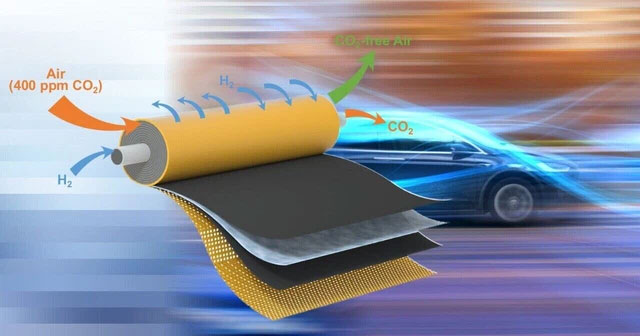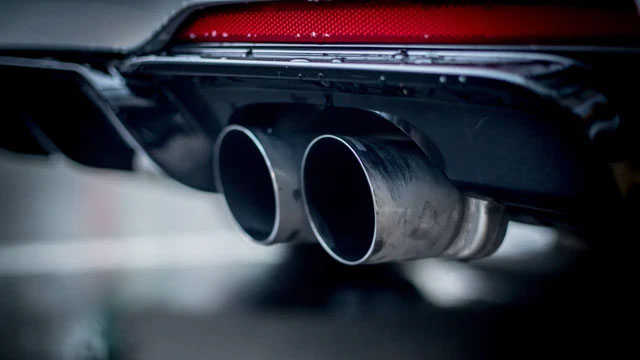Engineers at the University of Delaware have successfully demonstrated a method to remove 99% of carbon dioxide from the air using an advanced electrochemical machine powered by hydrogen. This significant breakthrough could lead to more environmentally friendly fuel cell technologies in the future.
The research team, led by Professor Yan Yushan, published their method for capturing CO2 in the journal Nature Energy.

Illustration of how the hydrogen-powered CO2 filtering system works.
Technology Boosting Fuel Cells
Fuel cells operate through a series of reactions that convert chemical energy into electrical energy. They have the potential to become a vital source of power for vehicles that utilize multiple energy types simultaneously or help reduce emissions from vehicles.
Professor Yan has spent years working on hydroxide exchange membrane (HEM) fuel cells, striving to improve them to replace the acid-based fuel cells that are still widely used. However, HEM fuel cells have a significant drawback: they are extremely sensitive to CO2 in the air. Essentially, HEM batteries cannot “breathe” normally in an atmosphere dense with carbon dioxide.
This vulnerability causes fuel cells to lose up to 20% of their efficiency, making the clean fuel not much better than conventional fossil fuels. For the past 15 years, Professor Yan’s research team has been trying to address the shortcomings of this promising technology.
A few years ago, the team recognized the potential benefit of this critical weakness: it could become a solution for filtering carbon dioxide.
“Once we delved deeper into the mechanism, we realized that the fuel cells absorb most of the carbon dioxide that interacts with them, and furthermore, they separate [carbon dioxide] very effectively,” said Assistant Professor Brian Setzler, a co-author of the new study.
This functionality is not suitable for an energy storage device, but if the research team could fully harness the self-filtering capability of carbon dioxide, the device could become an efficient CO2 separator.

What if cars were equipped with a CO2 filtering system that is 99% effective?
“It turns out this approach is very effective. We can remove 99% of the carbon dioxide present in the air in just one filtration, provided we design the model correctly and refine the function,” Professor Yan stated.
The team found a way to power the electrochemical system by entering the membrane separating the two parts of the fuel cell. This method could cause the battery to short-circuit internally.
“Indeed, it carries many risks; however, we have been able to control the fuel cell’s short circuit using hydrogen. And by using a pre-shortened separating membrane, we have been able to eliminate oversized components, such as the bipolar plate, current collecting devices, or wiring commonly found in fuel cell assemblies,” researcher Shi Lin noted.

Hydrogen is still referred to as the clean fuel of the future.
The team of scientists has developed an electrochemical device that resembles a conventional filter used in gas separation, but with the capability to continuously absorb even the smallest amounts of carbon dioxide, giving the device enormous application potential.
Research results indicate that a 5×5 cm electrochemical cell can remove up to 99% of carbon dioxide from a continuous airflow at a rate of 2 liters per minute. In previous experiments, a device the size of a soda can could filter 10 liters of air per minute, removing up to 98% of CO2.
According to Assistant Professor Setzler, when scaled up for installation in vehicles, the device will be approximately the size of a 5-liter can. However, its applications will not stop there. The device will lead to lighter, more efficient carbon dioxide filtration technologies suitable for enclosed spaces such as submarines or spacecraft, which require state-of-the-art air filtration systems. Over time, it will find its place in commercial airplanes, high-rise buildings, and many other constructions.
“We have several ideas for long-term applications that could truly help us reach that future,” scientist Setzler remarked. Professor Yan Yushan has established a company called Versogen aimed at researching clean hydrogen fuel and plans to invite Shi Lin to join once this researcher successfully defends his doctoral dissertation.


















































